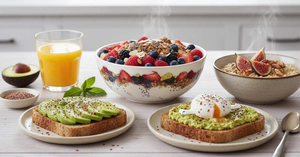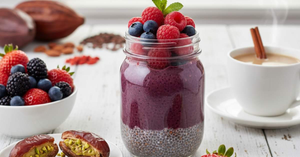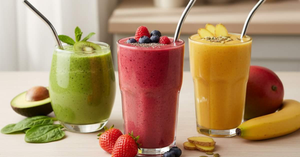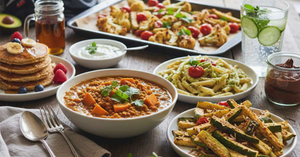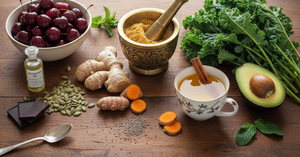During menstruation, the body works harder than usual. You lose blood, iron, and vital nutrients that can leave you feeling fatigued, bloated, or low in energy. Quick, balanced dinners can make a big difference in how you recover physically and emotionally during this phase. With a few smart choices, you can replenish nutrients, stabilize your mood, and restore energy without spending hours in the kitchen.
Several physiological factors explain why many women feel tired or sluggish during their periods:
A dinner that combines iron, complex carbohydrates, healthy fats, and hydration can effectively restore energy and help your body recover from menstrual stress.
According to the NHS Eatwell Guide and PubMed-reviewed nutritional studies, meals that support menstrual recovery should include:
Each of these meals is designed to be cooked in under 30 minutes while keeping nutrient balance in mind.
A traditional lentil dal with spinach or methi is rich in iron, magnesium, and plant protein. Add a squeeze of lemon juice to enhance iron absorption.
Serve with: Brown rice or whole-wheat roti.
Why it helps: Lentils provide slow energy release and fibre, preventing energy crashes during menstruation.
Cook salmon or tofu with olive oil, garlic, and mixed vegetables such as broccoli, carrots, and zucchini.
Serve with: Quinoa or millet for added protein and magnesium.
Why it helps: Omega-3 fatty acids reduce cramps and inflammation, while quinoa provides complex carbohydrates and iron.
Sauté boiled chickpeas with bell peppers, sesame seeds, and a light soy-ginger sauce.
Serve with: Steamed brown rice or whole-grain noodles.
Why it helps: Chickpeas are rich in iron, zinc, and protein. Sesame seeds add calcium and magnesium that ease muscle tension.
Scramble eggs with onions, tomatoes, and mild spices. Add spinach or methi at the end.
Serve with: Multigrain toast or roti.
Why it helps: Eggs contain easily absorbable iron and vitamin B12, both crucial for fighting period fatigue.
Combine boiled sweet potatoes, rajma (kidney beans), corn, and bell peppers. Top with curd or yogurt dressing and a dash of lemon.
Why it helps: Provides fibre, protein, and vitamin C. This combination helps replenish glycogen stores and supports gut health during PMS.
Cook moong dal and brown rice together with turmeric, cumin, and vegetables like carrots or spinach. Add a small spoon of ghee for healthy fat.
Why it helps: Gentle on digestion, high in protein, and rich in magnesium which is ideal for cramps and bloating.
Day 1:
Day 2:
Day 3:
Even though comfort food feels tempting, replacing fried or sugary dishes with wholesome warm meals keeps your mood and body more stable.
A 2020 systematic review found that omega-3 fatty acid supplementation significantly reduced menstrual pain and fatigue compared with placebo (PubMed PMID: 32167569).
Iron intake through food or supplementation has been shown to improve fatigue levels in women with heavy menstrual bleeding (NHS UK, 2023).
Balanced meals containing complex carbohydrates also improve serotonin synthesis, which can ease PMS-related mood changes (PubMed PMID: 29777968).
Quick, nutrient-dense dinners are one of the simplest ways to support your energy and mood during menstruation. Focus on iron-rich foods, vitamin C, magnesium, and omega-3s while keeping the meal light and warm. Traditional Indian staples like lentil dal, khichdi, and egg bhurji paired with whole grains and vegetables are perfectly suited for this purpose.
Recovering energy during your period is not about eating more, it’s about eating right. A balanced dinner restores depleted nutrients, reduces inflammation, and helps your body feel calm and nourished again.
About PeriodSakhi
PeriodSakhi is your trusted companion for understanding your menstrual health. With easy-to-use tools, it helps you track your periods, ovulation, fertility, moods, and symptoms, while providing insights into your overall reproductive and hormonal health. PeriodSakhi also serves as a supportive online community where women can share experiences, find reliable information, and access expert-backed guidance on menstrual health, PCOS, pregnancy, lifestyle, and more.
Disclaimer
The views, thoughts, and opinions expressed in this article/blog are solely those of the author and do not necessarily reflect the views of PeriodSakhi. Any omissions, errors, or inaccuracies are the responsibility of the author. PeriodSakhi assumes no liability or responsibility for any content presented. Always consult a qualified medical professional for specific advice related to menstrual health, fertility, pregnancy, or related conditions.
Start the conversation
No comments yet. Start the conversation by leaving the first comment!
